
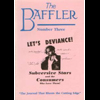
Number Three
(Greg Lane) Used paperback book $6.00 (Out-of-stock)
Let’s Deviance! from March 1992. The first appearance of in-house anti-hero Gedney Market, as well as the beginnings of The Baffler’s distinct style of cultural interpretation. To wit: Thomas Frank’s hipster demolition job and Rick Perlstein’s robust analysis of Scooby Doo. 108pp
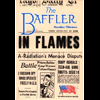
Number Thirteen
(Greg Lane) Used paperback book $6.00
Vox Populoid from December 1999. In which The Baffler kicks off a long-running study of American conservatism with a look at the nation’s long parade of kooks and cranks. In it, Jeff Sharlet remembers Westbrook Pegler, the “It Boy of attack journalism.” Dave Mulcahey remembers the backlash bible known as Reader’s Digest. Robert Nedelkoff remembers the black godfather of American fascism. And Dan Raeburn remembers when the beloved comic strip Li’l Abner took its sharp turn to the right. Dan Kelly tells the anti-heroic story of the John Birch Society. Daniel Lazare traces the career of The New Criterion’s Hilton Kramer. Christian Parenti singlehandedly launches the discipline of Seventies Studies with an essay about wildcat strikes. With microfilm-pastiche art by Hunter Kennedy and fiction by Aleksandar Hemon. 120pp
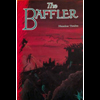
Number Twelve
(Greg Lane) Used paperback book $6.00 (Out-of-stock)
Then Came Nylon from March 1999. Thomas Frank’s classic essay “New Consensus for Old,” lays waste to the academic field of cultural studies. Jim Arndorfer stands in awe of the multilayered historical simulacrum that is Fado Irish Pub. Stephen Duncombe marvels at Cadillac, the historical embodiment of the aspirations of the middle class. Bryan Urstadt gives a blow-by-blow account of the luxuries of a major automobile press jaunt. A forgotten fictional delicacy by Thomas Beer is unearthed. Christian Parenti offers a slab of gritty reporting on the California prison system. Loïc Wacquant translates Pierre Bourdieu’s treatise on neoliberal thought. Plus: Rock n roll is dead, and Mike O’Flaherty says that late capitalism killed it. Cover art by Patrick Welch. 128pp
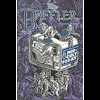
Number Eleven
(Greg Lane) Used paperback book $6.00
Mid-Cult Today from June 1998. An issue on middleness, which starts out—of course—with an essay on USA Today and the theory behind that colorful newspaper. Ben Metcalf seethes at the Mississippi River. Tom Vanderbilt explores a California ghost town that has become a federally subsidized film set. Dan Kelly lunches with Rotarians. Kim Phillips-Fein explores the bankruptcy industry and the morality of indebtedness a full ten years before these issues dawned on the rest of the nation. Marc Cooper remembers where he was on September 11, 1973. Also: an entertaining epistolary exchange between Chris Lehmann and Michael Bérubé. 128pp
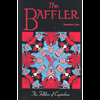
Number Ten
(Greg Lane) Used paperback book $6.00 (Out-of-stock)
The Folklore of Capitalism from September 1997. Matt Roth’s classic essay on Amway and how he happened to sign up for it. Thomas Frank reads Babbitt. Tom Vanderbilt marvels at the ubiquity of branding. Nelson Smith provides a history of security alarms. Chris Lehmann pops the culture bubble. Kim Phillips-Fein looks at the urban poverty initiative Bridges-to-Work. Mike Newirth remarks bitterly on the urban gentrification initiative known as Wicker Park. Stephen Duncombe questions why history books written by establishmentarians focus on underdogs. Seth Sanders reviews records, including Atari Teenage Riot’s first compilation and Wu Tang Forever. 128 pages.

Number Eight
(Greg Lane) Used paperback book $6.00 (Out-of-stock)
The Cultural Miracle from February 1996: “For all its great cable channels, the excellent new global cyber capitalism is turning out to be a lot like the simple, grinding, exploitative capitalism of a hundred years ago,” writes Thomas Frank in the lead essay, in which he begins to explore the ways we deceive ourselves about our basic economic interests. Mike Newirth pours a nice frosty cosmo for the One Percent, while Tom Vanderbilt calls Skyy vodka’s marketing efforts “a Reaganite shibboleth charted in the barroom.” Aaron Cohen praises Thirties band-leader Artie Shaw; Artie Shaw remembers dealing with the music industry in the Thirties. Gary Groth reads Quentin Tarantino. Daniel Harris writes about gay porn in the age of AIDS. 128pp

Number Seven
(Greg Lane) Used paperback book $6.00 (Out-of-stock)
The City in the Age of Information from June 1995. A gimlet stare at what twentieth-century capitalism has done for the American metropolis. Keith White reads city lifestyle magazines. Paul Lukas pays a visit to Times Square, then a retail wasteland. Naomi Klein hangs out at an online café. Maura Mahoney reads Midnight in the Garden of Good and Evil and finds it depicts Savannah, Georgia, as a Southern Gothic theme park. David Mulcahey reflects on the “Screw Capital of the World”: Rockford, Illinois. Kim Phillips-Fein regrets how lotteries bilk the poor, and Stephen Duncombe rankles at the way cities police them. Plus dialect fiction by Irvine Welsh. 128pp

Number Six
(Greg Lane) Used paperback book $6.00 (Out-of-stock)
Dark Age from December 1994: Thomas Frank’s “Why Johnny Can’t Dissent” is a once-in-a-generation lament that made punk rockers everywhere gasp at the futility of their attempts at rebellion. Keith White turns his guns on Wired Magazine, Stephen Duncombe subjects himself to corporate edutainment, and Seth Sanders braves the theme-restaurant wasteland of Chicago’s River North. Joanna Coles describes the collapse of publishing while Charles Bernstein finds a few signs of life. Will Boisvert decodes the management theorists. Tom Vanderbilt bemoans the imperial arrogance of advertisers. David Berman recalls his time as a security guard at the Metropolitan Museum of Art. 192pp. Some scuffing on cover.

Number Five
(Greg Lane) Used paperback book $6.00 (Out-of-stock)
Alternative To What from December 1993. To fully appreciate this issue of The Baffler, you have to transport yourself to a time when the word “alternative” did not provoke a reflexive cringe. Because the war on corporate culture continues with Steve Albini’s “The Problem with Music,” an essay that compares the act of signing with a major label to traversing a trench filled with “runny, decaying shit.” Plus: Keith White’s legendary takedown of Details magazine. Herbert Mattelart assails world music, Eric Iversen follows the search for the new Seattle, and Thomas Frank probes the nullity that is Pearl Jam. Maura Mahoney deflates the Beat revival, and Tom Vanderbilt wonders about the day when retro culture finally catches its own tail. 168pp. Scuffed cover